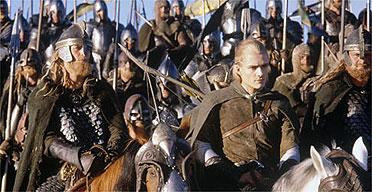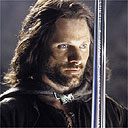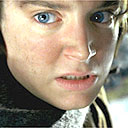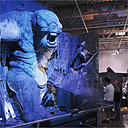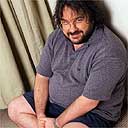It is finished. It is all over. The mighty conflict is at an end. And we, the dazed and shellshocked audience for Peter Jackson's colossal fantasy über-epic are permitted to disperse, as across the battlefield at sunset, picking our way through the horse-cadavers, twitching orcs and fallen warriors.
No flabber has been left ungasted by Mr Jackson's mighty battle sequences, nor no gob unsmacked. After three hours and 21 minutes of devastatingly sustained assault, underpinned by an almost continuous horn-blaring, kettle-drum-bothering orchestral soundtrack, we've got our hands up. It's been a long, long final instalment, and never boring - although sometimes you feel the way prog rock fans must have felt on listening to the final side of Yessongs, glancing over at the needle tracking through the vinyl and realising it's not over yet, not by a long way.
Was it really only two years ago that Peter Jackson's The Lord of the Rings started? This giant movie marathon has dominated everyone's attention and its reputation has grown exponentially while other event-movie franchises have floundered. In Jackson, the Tolkien legend found the perfectly sympathetic director to realise its Arthuro-Nordic saga, and in Lord of the Rings, the computer-generated image technology found the perfect medium for the stunning new effects now possible.
Technically it really is superb, with breathtaking landscape tableaux and settings, seamlessly meshing cyber-geography with the New Zealand locations. It is another triumph for production designer Grant Major and cinematographer Andrew Lesnie.
But does it deserve those excitable claims of greatness? A moral exposition of good versus evil? After The Two Towers, I heard normally sensible critics jabbering the word "Miltonic". But imagine if Milton had decided to cut Satan out of Paradise Lost. Because Jackson has cut Saruman out of Return of the King: the evil lord so brilliantly conveyed by Christopher Lee. I don't know how that plays with the Tolkie purists, but I'm disappointed. Lee was one of only two really good acting performances in the series, among all the simpering maidens and beefcakes and callow hobbits, the other being Ian McKellen's splendid Gandalf. Saruman gone! Could it be that Peter Jackson decided that what with all the expensive battle scenes, there wasn't time? He could have cut half the shots of Elijah Wood's Frodo doing his bug-eyed, smudgy-faced worried expression, and freed up about 20 minutes. But there we are. Without Saruman, it's not good versus evil. It's good versus... a sort of swarming amorphous danger.
Hours after watching the film, I can close my eyes and see those incredible battle scenes pulsing and throbbing in my skull. They are even more extravagant than his jaw-dropping siege of Helm's Deep in The Two Towers. They have giant elephants and swooping pterodactyls. After the second movie, I compared his epic military setpieces to Kurosawa, but it's a condescension he no longer deserves. His battles are a thing of wonder on their own account. Maybe Kurosawa's battles will one day be described as proto-Jacksonian. And for the first time in this series they are built on to a plot with some narrative force.
The two feisty young hobbits Frodo (Wood) and Sam (Sean Astin) journey to Mordor in the company of the wicked and duplicitous Gollum (Andy Serkis) to destroy the Ring. Meanwhile, the forces of good led by Aragorn (Viggo Mortensen) embark on a massive diversionary tactic: an all-out assault on the orcs, to distract the evil one from seeing that Frodo is going to dispose of the Ring he covets. And there are loads of other showstopping moments, including a creepy tangle with a spider.
It's a fantastic spectacle, but how much you really love it will depend on testicle-altitude. Unlike other fantasy stories which have an airy sense of buoyancy, The Lord of the Rings always has that stolid, puddingy heaviness, the earnestly childlike quality of which almost, but not quite, prevents it from being pompous.
After every long-bearded, pointy-eared thing has been said and done, after every hobbity madrigal has been crooned, every unfunny pipe-smoking bit of business complete and every Elvish phrase solemnly intoned - subtitled, not dubbed - has this film anything meaningful to say about war, or about the eternal moral contest with evil?
Well, with Saruman's omission there is no compelling intelligence directing the forces of darkness; the face of evil effectively has to be Gollum who, although nasty, is no worthy dramatic counterpoint for Aragorn and Gandalf. And anyway, in Return of the King, apart from the sacrificial loss of Bernard Hill's King Theoden, who is poignantly old anyway, the only people killed in battle are trillions and trillions of nameless beasties and anonymous hordes. No one important. Very different from warfare in the non-toytown world.
There is no sobering experience of loss, no real sense of the obscenity and tragedy of war and therefore nothing really at stake. That's why it appeals to adolescent boys, and to adults sentimentally loyal to their departed, adolescent selves.
It may seem churlish to remember how shallow The Lord of the Rings is, when the Peter Jackson movies have turned out to be such terrifically enjoyable escapism. I started the series an atheist and finished an agnostic.
With enormous energy and a passionately exacting eye for detail, Jackson has made the regressive-romantic legend live again. He has given the Tolkien myth a turbo-charged rush into the 21st century. It's tripe. But he's made it mind-blowing tripe.
